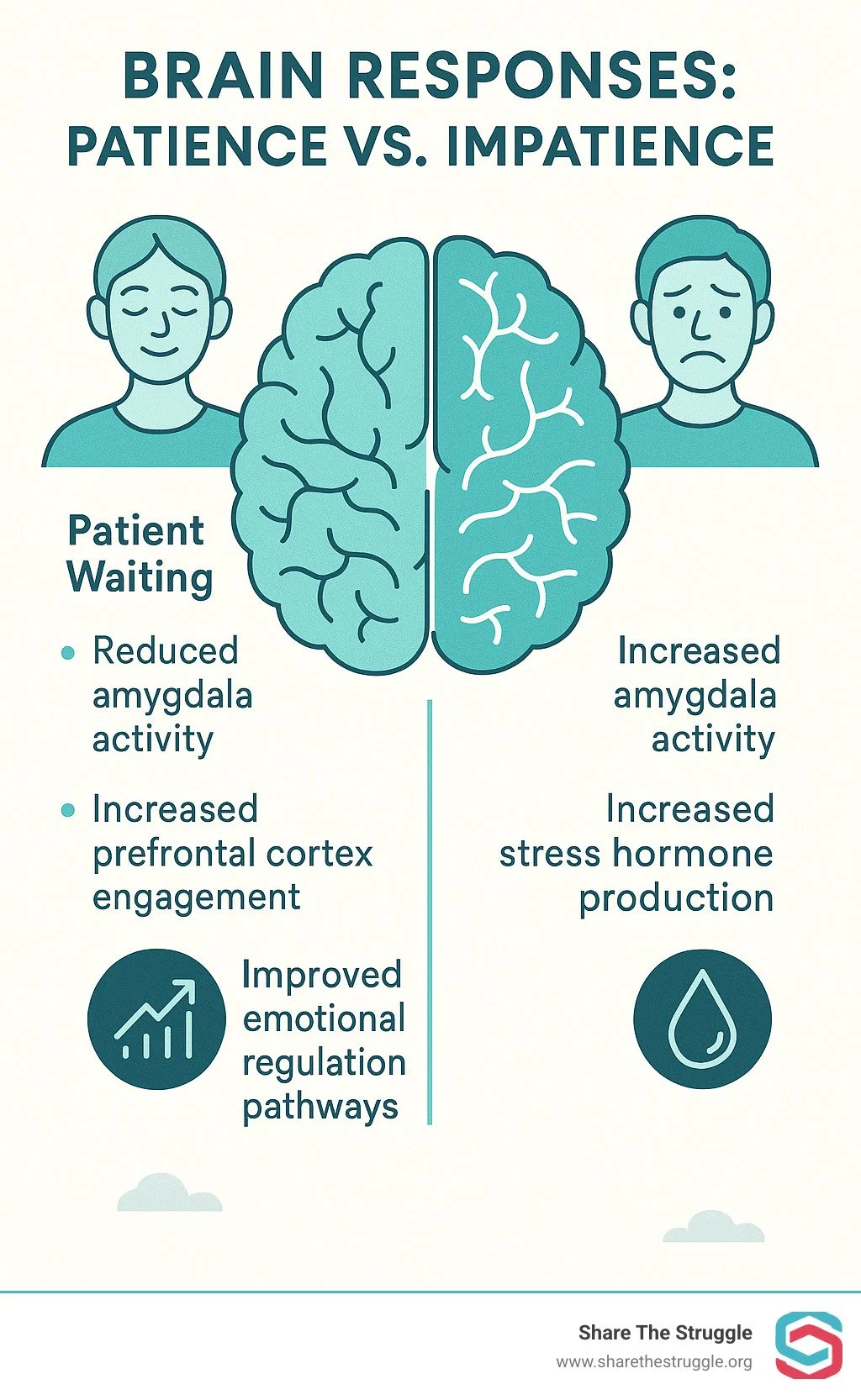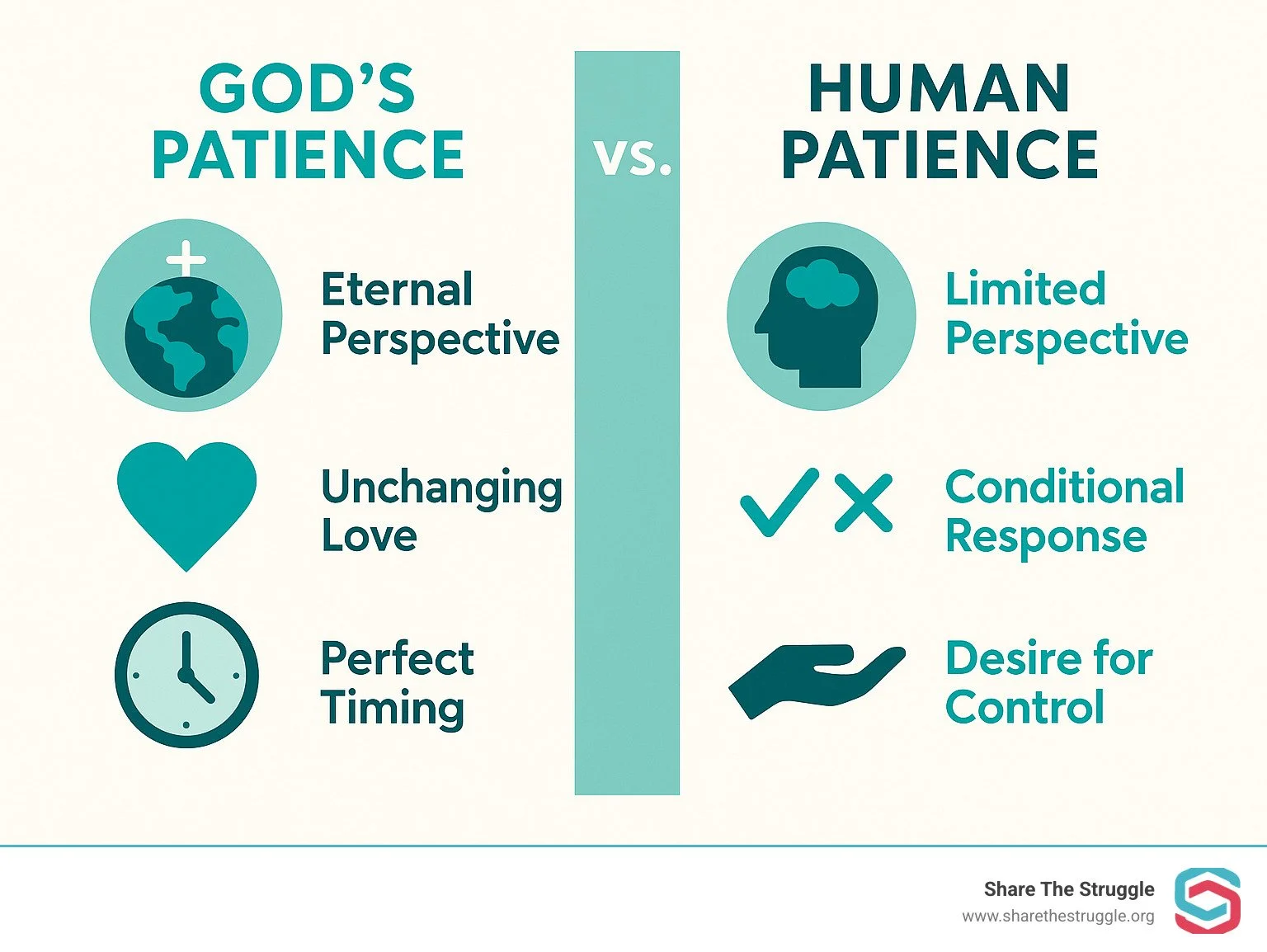Patience in the Bible: Stories and Lessons
The Power of Patience in a Fast-Paced World
Biblical examples of patience offer timeless wisdom for our modern, instant-gratification culture. If you're looking for the most significant examples of patience in Scripture, here are the key figures:
Abraham and Sarah - Waited 25 years for the promised son Isaac (Genesis 12-21)
Job - Endured devastating losses while maintaining faith (Book of Job)
Joseph - Remained faithful through 13 years of slavery and imprisonment before his rise to power (Genesis 37-50)
David - Waited approximately 15 years between his anointing and actually becoming king (1 Samuel 16-2 Samuel 2)
Hannah - Prayed persistently for a child despite years of infertility (1 Samuel 1)
Simeon and Anna - Waited their entire lives to see the promised Messiah (Luke 2:25-38)
Moses - Led the Israelites through 40 years in the wilderness (Numbers 14:33-34)
When Amazon delivers in 48 hours and we can stream movies instantly, the concept of waiting feels almost foreign. Yet the struggles we face—anxiety, relationship challenges, personal growth—all require something that can't be rushed: patience.
"Patience is not something we do, but who we are in Christ," notes one biblical scholar. This perspective transforms our waiting from passive endurance to active spiritual formation.
When life's challenges test our limits, these ancient stories remind us that waiting isn't merely about the passage of time—it's about how we grow during seasons of delay. For those navigating anxiety or trauma, biblical patience offers a framework for developing emotional resilience and spiritual strength.
As we explore these powerful examples, we'll find that patience isn't just about waiting—it's about trusting God's timing while actively participating in your own healing journey. This understanding can be particularly valuable for those seeking faith-based approaches to mental health challenges.
Why Study "Biblical Examples of Patience" Today?
In our hyper-connected world of instant notifications and immediate responses, patience can feel like an outdated virtue. Yet the search for biblical examples of patience continues to trend because these ancient stories speak directly to our modern struggles.
When we examine these narratives, we find that patience isn't passive waiting—it's active trust in God's timing and purposes. This distinction is crucial for our mental and emotional wellbeing. Research shows that cultivating patience reduces stress hormones, improves decision-making, and strengthens relationships.
For those struggling with anxiety, depression, or trauma, biblical patience offers a faith-based framework for building emotional resilience. These stories show us that even God's most faithful servants experienced profound waiting seasons—and emerged stronger for it.
As we at Share The Struggle work with individuals facing mental health challenges, we've seen how understanding biblical patience can transform the waiting process from one of frustration to one of purposeful growth. These examples remind us that we're not alone in our struggles, and that periods of waiting often precede the most significant breakthroughs in our lives.
Abraham & Sarah: Trusting the 25-Year Promise
When we talk about waiting on God, few stories capture the essence of patience quite like Abraham and Sarah. Their journey represents perhaps the most profound biblical example of patience in the Old Testament—a testament to faith that spans decades of uncertainty and hope.
Imagine being 75 years old when God first whispers a promise that you'll become "a great nation" (Genesis 12). For Abraham and Sarah (then called Abram and Sarai), this wasn't just any promise—it required the seemingly impossible: a child born to a couple well beyond childbearing years.
What followed wasn't a quick miracle but a 25-year waiting period. Think about that—twenty-five years of holding onto a promise while life continued to unfold in ways that seemed to contradict it. During this quarter-century:
Abraham and Sarah left behind everything familiar, becoming nomads in a foreign land. They weathered famine, faced threats to their marriage, and watched as others around them celebrated the births of their children. All while Sarah's biological clock ticked well past what seemed possible.
I love the raw humanity captured in Genesis 17:17 when God reaffirms his promise: "Abraham fell facedown; he laughed and said to himself, 'Will a son be born to a man a hundred years old? Will Sarah bear a child at the age of ninety?'" Can you hear the mix of hope and disbelief in his laughter? How many of us have responded similarly when God's promises seem too good to be true?
The miracle finally arrived when Abraham reached 100 years of age and Sarah 90—a birth that defied every natural law. As Genesis 21:1-2 beautifully states: "The Lord visited Sarah as he had said, and the Lord did to Sarah as he had promised. And Sarah conceived and bore Abraham a son in his old age at the time of which God had spoken to him." This miracle birth of Isaac fulfilled God's covenant in the most unexpected way.
Key Lessons from this Biblical Example of Patience
Abraham and Sarah's story offers rich insights for our own waiting seasons:
Faith grows stronger through waiting. Romans 4:18-21 tells us that "Against all hope, Abraham in hope believed." What's remarkable isn't just that Abraham believed initially, but that he continued believing even as circumstances made the promise seem increasingly impossible. His faith actually "grew stronger" through the waiting. When we're tempted to think waiting weakens our faith, Abraham reminds us it can be the very thing that strengthens it.
Human shortcuts create unnecessary pain. Perhaps the most relatable moment in their journey comes in Genesis 16, when Sarah suggests Abraham father a child with her servant Hagar. This "practical solution" to God's seemingly delayed promise created years of family tension and heartache. How often do we do the same? When God's timing feels too slow, we take matters into our own hands, only to create complications we never intended.
Waiting transforms who we are. Romans 4:20 reveals something profound about Abraham's waiting period: he "grew strong in his faith as he gave glory to God." The waiting wasn't wasted time—it was transformative. Those 25 years weren't just about getting Abraham and Sarah ready to parent Isaac; they were about shaping them into people who could carry God's covenant forward.
In our work with clients facing mental health challenges, we often find that patience isn't just about enduring until circumstances change—it's about allowing God to change us in the waiting. The person who emerges from a season of patient trust is often fundamentally different from the one who entered it.
Whether you're waiting for healing, restoration in a relationship, or clarity about your future, Abraham and Sarah remind us that God's delays are never denials. Their story invites us to trust that what God has promised, He will fulfill—in His perfect timing.
For more encouragement during your waiting season, explore our collection of Bible Verses About Patience.
Job: The Gold Standard of Perseverance
When someone mentions biblical examples of patience, Job immediately comes to mind. There's a reason "the patience of Job" has entered our everyday language as the ultimate expression of endurance. His story isn't just remarkable—it's almost unimaginable in its intensity.
Imagine having your entire life collapse in a single day. That's what happened to Job. In a devastating sequence of events, he lost everything—his wealth, his servants, and most heartbreakingly, all ten of his children. As if that weren't enough, painful sores then covered his body from head to toe. His wife, overwhelmed by their shared tragedy, could only suggest, "Curse God and die." Even his friends, who came to comfort him, eventually turned to accusation, insisting he must have committed some terrible sin to deserve such suffering.
Yet Job's first response reveals his extraordinary character: "Naked I came from my mother's womb, and naked I will depart. The LORD gave and the LORD has taken away; may the name of the LORD be praised" (Job 1:21).
What makes Job's patience so profound isn't stoic silence or fake positivity. Throughout the book bearing his name, Job openly wrestles with his pain. He questions, he laments, he even expresses anger—yet he never abandons his fundamental trust in God. This is true patience: not the absence of emotional struggle, but the presence of unwavering faith despite that struggle.
James 5:11 specifically points to Job as our model: "As you know, we count as blessed those who have persevered. You have heard of Job's perseverance and have seen what the Lord finally brought about. The Lord is full of compassion and mercy."
After enduring his trials and experiencing a profound divine encounter, Job's story comes full circle. "After Job had prayed for his friends, the LORD restored his fortunes and gave him twice as much as he had before" (Job 42:10). God blessed him with double his previous wealth, ten more children, and 140 additional years of life.
How "Biblical Examples of Patience" Shape Our View of Suffering
Job's journey through unimaginable loss offers us three transformative insights about patience in our own painful seasons:
Honest prayer strengthens patience, rather than undermining it. Many of us believe that expressing doubt or frustration somehow demonstrates a lack of faith. Job shows us otherwise. He poured out raw laments and difficult questions, yet maintained his foundational trust in God. When I work with coaching clients navigating depression or grief, I often point to Job as permission to bring their unfiltered emotions to God. True patience includes honest communication, not just silent endurance.
Resilience grows through struggle, not in spite of it. Job wasn't emotionally untouched by his suffering—he grieved deeply and questioned intensely. Yet through this painful process, his spiritual muscles strengthened. After his encounter with God, Job could say, "My ears had heard of you but now my eyes have seen you" (Job 42:5). His suffering, while terrible, led to a more intimate knowledge of God than he'd ever experienced before. In our coaching sessions, we often find that our most difficult seasons become the soil for our deepest growth.
Faith means trusting beyond understanding. Perhaps the most striking aspect of Job's story is that he never received a direct explanation for his suffering. Instead, God revealed His sovereignty and wisdom through a series of questions that highlighted the limits of human perspective. This reminds us that patience often means trusting God when we can't trace His hand. Romans 8:28 promises that "in all things God works for the good of those who love him," but this doesn't guarantee we'll understand how our current pain fits into God's greater purposes.
When life feels overwhelming and God seems distant, Job's example reminds us that we're not alone in our questions. His story creates space for both honest struggle and steadfast trust—a balance we help our coaching clients find as they steer their own difficult seasons.
For a deeper exploration of how Job's patience might transform your approach to suffering, see What Does it Mean to Have the Patience of Job?.
Joseph: From Pit to Palace
Joseph's journey from favored son to Egyptian prison to second-in-command of Egypt spans 13 years and represents one of the most dramatic biblical examples of patience. His story, told in Genesis 37-50, demonstrates how patience through injustice can lead to divine purpose.
Joseph's waiting began with betrayal by his own brothers, who sold him into slavery when he was just 17 years old. In Egypt, he served faithfully in Potiphar's house until false accusations of attempted rape landed him in prison. Even there, Joseph maintained integrity and used his gift of dream interpretation to help others.
What makes Joseph's patience remarkable is that he had every reason to become bitter. Consider the injustices he faced:
Betrayal by his own family
Being sold as property
False accusations despite his integrity
Being forgotten by the cupbearer he helped in prison
Yet throughout these trials, Genesis repeatedly notes that "the LORD was with Joseph." Rather than becoming consumed by resentment or self-pity, Joseph remained faithful in each circumstance. He worked diligently as a slave, served responsibly as a prisoner, and ultimately rose to become Pharaoh's right-hand man at age 30.
The payoff for Joseph's patience came not just in his personal elevation but in the salvation of his family and the entire region during a severe famine. When his brothers finally stood before him, fearing retribution, Joseph offered this profound perspective in Genesis 50:20: "You intended to harm me, but God intended it for good to accomplish what is now being done, the saving of many lives."
Patience, Forgiveness, and Leadership
Joseph's story interweaves patience with several other virtues that offer powerful lessons for our lives today:
1. Patience enables forgiveness
Perhaps the most moving aspect of Joseph's story is his ability to forgive his brothers. When he finally revealed himself to them in Genesis 45, he didn't focus on their betrayal but on God's greater purpose: "Do not be distressed and do not be angry with yourselves for selling me here, because it was to save lives that God sent me ahead of you."
This level of forgiveness would have been impossible without the perspective gained through patient endurance. Joseph had enough distance from the initial pain to see God's hand at work through his suffering. This reminds us that patience often gives us the perspective needed to forgive profound hurts.
2. Patient faithfulness in small things prepares us for greater responsibility
Throughout his journey, Joseph demonstrated faithfulness regardless of his circumstances. As a slave, "the LORD gave him success in everything he did" (Genesis 39:3). As a prisoner, he was put in charge of all the other prisoners (Genesis 39:22).
This pattern teaches us that how we wait matters as much as what we're waiting for. Joseph didn't put his life on hold during his 13 years of waiting—he excelled wherever he was placed. This faithful stewardship of smaller responsibilities prepared him for the massive leadership role God ultimately had for him.
3. Patience allows God's timing to unfold
Joseph's gift of dream interpretation was evident early in his life, but it took years of preparation before he was ready to interpret Pharaoh's dreams and implement a national salvation plan. Had Joseph been liftd to leadership prematurely, he might not have developed the character, wisdom, and humility needed for such responsibility.
In our own lives, we often want immediate advancement or healing. Joseph's story reminds us that God's timing includes necessary preparation periods that we may not understand until later. Many of our coaching clients find that their periods of waiting—while painful—were actually preparing them for future opportunities they couldn't have handled earlier.
For a deeper dive into biblical patience and its application to your life, consider our Patience Bible Study resources.
David: Waiting for the Crown
Among the biblical examples of patience, few stories capture the tension of waiting quite like David's journey from shepherd to sovereign. Imagine being told as a teenager that you're destined for greatness, then spending the next 15 years of your life running for your life instead of ruling from a throne.
That was David's reality. Anointed as Israel's future king when he was just a boy (likely around 15 years old), David wouldn't actually wear the crown until age 30. Those intervening years weren't spent in comfortable preparation—they were filled with danger, betrayal, and uncertainty.
After his stunning victory over Goliath, David briefly enjoyed favor in King Saul's court. But Saul's admiration quickly soured into jealousy and then murderous rage. Before long, the shepherd-turned-warrior found himself living as a fugitive, hiding in caves like the famous Adullam, surviving in wilderness areas, and even seeking refuge among Israel's enemies—all while Saul hunted him with thousands of soldiers.
What makes David's patience remarkable was his restraint when opportunity knocked. Twice, in 1 Samuel 24 and 26, David had clear chances to kill Saul and claim the throne by force. Both times, he refused. "I will not lay my hand on the LORD's anointed," he declared (1 Samuel 24:10), choosing the longer path of waiting over the shortcut of violence.
David's psalms written during this period give us a window into his emotional struggles. His words in Psalm 13:1-2 could easily be our own during difficult waiting seasons: "How long, LORD? Will you forget me forever? How long will you hide your face from me? How long must I wrestle with my thoughts and day after day have sorrow in my heart?"
Yet even in his raw laments, David consistently circled back to trust. His counsel in Psalm 27:14 has comforted waiting hearts for centuries: "Wait for the LORD; be strong and take heart and wait for the LORD."
Cultivating Patience Under Opposition
David's journey offers us practical wisdom for those seasons when we're waiting while under pressure:
Self-control trumps immediate gratification every time. When David stood in that cave at En Gedi with Saul completely vulnerable before him, his men whispered that God had delivered his enemy into his hands. The temptation to end his suffering with one swift stroke must have been overwhelming. Instead, David chose the harder path—cutting off merely a piece of Saul's robe to prove he could have taken more but chose not to.
This embodied the wisdom of Proverbs 16:32: "Better a patient person than a warrior, one with self-control than one who takes a city." True strength isn't about exercising power when we can, but restraining it when we should.
Waiting builds leadership character in ways that shortcuts never could. David's wilderness years weren't wasted time—they were formative. During this period, he gathered around 600 followers described as "everyone who was in distress or in debt or discontented" (1 Samuel 22:2). Through his leadership, these troubled individuals were transformed into "mighty men" whose exploits would later become legendary.
This waiting period developed David's leadership abilities, emotional intelligence, and dependence on God—all essential qualities he would need as king. Had he bypassed this difficult season, he might have taken the throne with the heart of a warrior but not the wisdom of a king.
God's timing includes protection we often can't recognize until later. With hindsight, we can see that David's waiting period actually shielded him from premature responsibility. Taking the throne too early might have been disastrous both for David personally and for the nation. The waiting allowed for Saul's reign to complete its purpose and for David to mature into the leader Israel needed.
This perspective helps us reframe our own waiting seasons. What feels like divine delay might actually be divine protection, preparing both us and our circumstances for the right moment. Many of our coaching clients at Share The Struggle initially come to us frustrated by life's delays, only to later recognize how those pauses protected them from situations they weren't yet equipped to handle.
When you're in a season of waiting—especially under opposition—having someone walk alongside you can make all the difference. Our coaches are trained to help you steer these challenging times with both biblical wisdom and practical strategies for emotional resilience. Sometimes the greatest act of patience is simply reaching out for support when the waiting feels too heavy to bear alone.
More Inspiring "Biblical Examples of Patience"
While Abraham, Job, Joseph, and David give us deep insights into patience, Scripture offers many other beautiful examples that speak to different aspects of waiting on God's timing.
Hannah's Persistent Prayer
Few stories capture the heartache of waiting like Hannah's journey through infertility. In 1 Samuel 1, we meet a woman whose pain was doubled—not only could she not conceive, but she endured the constant mockery of her husband's other wife, Peninnah.
What makes Hannah's patience so touching is how she channeled her pain. Rather than becoming bitter or giving up, she continued bringing her request before God year after year. Her tears became prayers, and her longing became worship.
When Hannah finally conceived Samuel, she fulfilled her vow to dedicate him to God's service—revealing that her desire wasn't merely for personal fulfillment but aligned with God's greater purposes. Samuel would become one of Israel's greatest prophets and leaders.
For anyone struggling with seemingly unanswered prayers, Hannah reminds us that persistent patience isn't about wearing God down. It's about allowing our hearts to be shaped through the waiting, so that when the answer comes, we're ready to receive it with open hands.
Simeon and Anna's Lifelong Vigil
Imagine waiting your entire life for one promised moment. That's exactly what Simeon and Anna did, as Luke 2:25-38 tells us.
Simeon, described as "righteous and devout," had received a promise from the Holy Spirit that he wouldn't die before seeing the Messiah. Anna, an 84-year-old widow, had devoted herself to "worship night and day, fasting and praying" in the temple for decades.
When Mary and Joseph brought the infant Jesus to the temple, these two elderly believers immediately recognized Him as the promised One. Simeon's response captures the sweet fulfillment of patient waiting: "Lord, now you are letting your servant depart in peace, according to your word; for my eyes have seen your salvation."
Their story speaks powerfully to those in long waiting seasons—some promises require a lifetime of patient faithfulness. Yet when fulfillment comes, it makes even decades of waiting worthwhile. Simeon and Anna's joy reminds us that patient endurance in spiritual disciplines bears fruit in God's perfect timing.
The Israelites' 40-Year Journey
Not all waiting is individual—sometimes entire communities must learn patience together. The Israelites' 40-year wilderness journey stands as a national example of waiting that should have been unnecessary.
What should have been an 11-day journey from Egypt to Canaan (Deuteronomy 1:2) stretched into four decades because of fear and unbelief. Numbers 14:33-34 explains this extended waiting period: "Your children will be shepherds here for forty years, suffering for your unfaithfulness, until the last of your bodies lies in the wilderness."
This national waiting period served several purposes:
It allowed the unbelieving generation to pass away
It formed the identity of the new generation through shared experience
It taught complete dependence on God through daily provision of manna
This example honestly acknowledges that sometimes our waiting periods result from our own choices. Yet even when waiting comes as discipline, God remains faithful—providing, protecting, and preparing His people for the promise ahead.
God's Patient Forbearance
Perhaps the most profound biblical example of patience isn't human at all—it's God Himself. Throughout Scripture, we witness God's remarkable patience with humanity:
He waited 120 years while Noah built the ark before sending the flood (Genesis 6:3). He endured 430 years of Israelite slavery in Egypt before bringing deliverance (Exodus 12:40-41). He sent prophet after prophet to warn Israel and Judah before allowing exile.
2 Peter 3:9 beautifully captures God's patient heart: "The Lord is not slow in keeping his promise, as some understand slowness. Instead he is patient with you, not wanting anyone to perish, but everyone to come to repentance."
This divine patience offers both a model to follow and comfort in our own waiting. If the eternal God exercises such patience with us—limited, imperfect beings—surely we can extend that same grace to ourselves and others as we grow.
Jesus' Patient Ministry
Even Jesus, with only three years of public ministry, demonstrated remarkable patience. Despite knowing His time was short, He invested deeply in twelve ordinary men who frequently misunderstood His mission. He patiently explained parables, corrected misunderstandings, and even restored Peter after his denial.
Mark 4:33-34 highlights Jesus' thoughtful approach: "With many similar parables Jesus spoke the word to them, as much as they could understand. He did not say anything to them without using a parable. But when he was alone with his own disciples, he explained everything."
This patient, personalized teaching reminds us that true growth can't be rushed. Jesus knew that change happens gradually, with understanding unfolding over time.
For a deeper exploration of biblical patience and its applications today, our article on What is the Biblical Definition of Patience? offers valuable insights.
Snapshot Lessons from Biblical Patience
Looking across these diverse examples, several consistent principles emerge that can transform our own waiting seasons:
Active waiting versus passive resignation
Biblical patience never looks like merely sitting around. In each example, we see individuals actively engaged during their waiting—praying like Hannah, serving faithfully like Joseph, fulfilling current responsibilities like Abraham, or practicing spiritual disciplines like Anna. Patience isn't passive; it's purposeful engagement with the present while trusting God for the future.
Prayer and fasting strengthen patience
Many of these examples highlight how spiritual disciplines sustain us during waiting periods. Hannah poured out her heart at the temple. Anna worshiped with fasting and prayer for decades. David wrote psalms expressing both his struggles and his trust.
These practices remind us that patience grows stronger through intentional spiritual connection. In our coaching sessions, we often find that clients who develop consistent prayer practices report greater peace and perspective during their waiting seasons.
Divine mercy meets human weakness
Throughout these examples, we see God's patience with human impatience. Abraham and Sarah tried to force God's promise through Hagar. The Israelites complained constantly during their wilderness journey. David occasionally fell into despair in his psalms.
Yet in each case, God's patience exceeded human failure. This reminds us that developing patience is a process, not an instant achievement. God continues working with us even when our patience falters.
Conclusion: Applying Biblical Patience to Modern Life
When life puts us in waiting rooms, these biblical examples of patience offer more than historical stories—they provide a roadmap for our own journeys. Through these accounts, we find that patience isn't simply enduring time passing, but a transformative practice that shapes who we become.
The waiting seasons of Abraham, Job, Joseph, and David reveal something profound: patience is active, not passive. Each of these biblical figures continued serving, growing, and trusting during their waiting periods. They didn't put their lives on hold while waiting for God's promises—they leaned into their present circumstances while maintaining hope for the future.
Perhaps what's most encouraging is seeing how waiting often serves purposes beyond the wait itself. Joseph's time in prison developed the leadership and administrative skills he would need as Egypt's second-in-command. David's years in the wilderness forged his character and spiritual dependence on God—essential qualities for the king he would become. Your current waiting period isn't wasted time—it's preparation.
Many of us rush through waiting seasons, anxious to reach the next milestone. Yet these biblical examples suggest that God's timing includes both provision and protection. What feels like frustrating delay might actually be divine protection, shielding us from responsibilities or relationships we're not yet equipped to handle. As one client recently shared, "Looking back, I'm grateful God didn't answer my prayer when I wanted—I wasn't ready for what I was asking for."
For those struggling with anxiety or depression during extended waits, these stories offer particular comfort. They remind us that honest struggle is compatible with patient endurance. Job questioned God. David wrote raw laments. Hannah wept bitterly. Biblical patience doesn't require us to suppress our emotions or pretend everything is fine—it invites us to bring our authentic struggles to God while continuing to trust His character.
It's also worth noting that patience is developed, not instantly acquired. None of these biblical figures demonstrated perfect patience from the beginning. Abraham tried to "help" God by having a child with Hagar. The Israelites complained throughout their wilderness journey. Even David occasionally gave in to despair. Yet God continued working with them, gradually developing their capacity for trust and endurance.
At Share The Struggle, we've witnessed how these principles transform the way people steer their mental and emotional challenges. Our captive-thoughts coaching model helps individuals apply these biblical truths to their specific circumstances, developing patience as part of overall emotional resilience.
When we learn to "take every thought captive" (2 Corinthians 10:5) during waiting seasons, we can replace anxiety, frustration, and despair with the patient trust exemplified by these biblical figures. This doesn't mean waiting becomes easy, but it becomes purposeful—a time of growth rather than mere endurance.
If you're currently in a season of waiting—whether for healing, restoration, direction, or breakthrough—connecting with one of our trained coaches could help you steer this time with greater purpose and peace. Through weekly individual sessions or affordable group coaching, you can learn practical ways to cultivate biblical patience in your specific situation.
Our coaches provide compassionate guidance to help you:
Recognize thought patterns that undermine patience
Develop spiritual practices that strengthen your ability to wait well
Find meaning in your current waiting season
Build emotional resilience based on biblical examples
Patience may be a fruit of the Spirit (Galatians 5:22), but like all spiritual fruit, it grows through intentional cultivation. With weekly group sessions available for $40/month and individual coaching starting at $180/month, we offer accessible support for your journey toward biblical patience.
You're not alone in your waiting. These biblical examples remind us that God's most faithful servants experienced profound waiting seasons—and emerged stronger, wiser, and more prepared for God's purposes. Your story of patience is still being written, and with the right support, it can become a powerful testimony of faith and endurance.
For more information about our coaching services and how they can support your journey, visit our coaching page.





